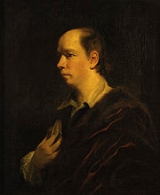
writer, poet and physician
known for his novel
The Vicar of Wakefield
(1766), his pastoral poem The Deserted Village (1770) (written in memory of his brother), and his plays The Good-Natur'd Man
(1768) and She Stoops to Conquer
(1771, first performed in 1773). He also wrote An History of the Earth and Animated Nature. He is thought to have written the classic children's tale The History of Little Goody Two-Shoes
, the source of the phrase "goody two-shoes".
Goldsmith's birth date and year are not known with certainty.
Men may be very learned, and yet very miserable; it is easy to be a deep geometrician, or a sublime astronomer, but very difficult to be a good man. I esteem, therefore, the traveller who instructs the heart, but despise him who only indulges the imagination. A man who leaves home to mend himself and others, is a philosopher; but he who goes from country to country, guided by the blind impulse of curiosity, is only a vagabond.![]()
Such dainties to them, their health it might hurt;It's like sending them ruffles, when wanting a shirt.![]()
There is no arguing with Johnson: for if his pistol misses fire, he knocks you down with the butt end of it.![]()
[To Mr. Johnson] If you were to make little fishes talk, they would talk like whales.![]()
You may all go to pot.![]()
One writer, for instance, excels at a plan or a title page, another works away at the body of the book, and a third is a dab at an index.![]()
As writers become more numerous, it is natural for readers to become more indolent.![]()
Good people all, with one acord,Lament for Madame Blaize,Who never wanted a good word —From those who spoke her praise.![]()
That strain once more; it bids remembrance rise.![]()

